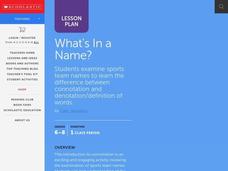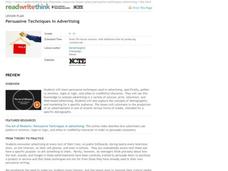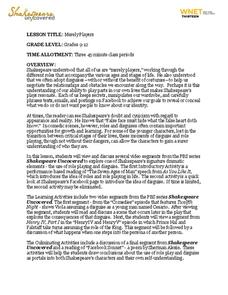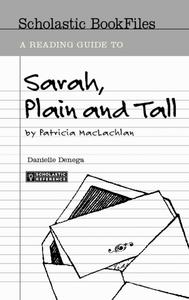Google
Animation: Studio Logo
Logos just make a club seem more fun. Scholars incorporate knowledge from previous lessons in the unit to write a computer program in the Scratch block-based language. Their program should help design a logo for the CS First studio. A...
British Council
A New Logo for the World Wildlife Fund
Where does the money go? Learners take a look at the logo for the World Wildlife Fund and discuss characteristics of the panda in the logo. Scholars learn that cute, fuzzy endangered animals often receive the most donations. They keep...
K20 LEARN
Words Before Blows: Julius Caesar
Scholars examine how Brutus and Mark Antony employ ethos, pathos, and logos in their speeches to persuade the angry crowd in Act 3, scene 2 of William Shakespeare's tragedy, Julius Caesar. To set the stage, groups first identify the...
Dream of a Nation
Read, Watch, Write for Pathos, Logos and Ethos
Encourage your young citizens to make a difference. Using Tyson Miller's Dream of a Nation: Inspiring Ideas for a Better America as a starting point, class members watch documentaries, investigate issues, and then write letters to...
Utah Education Network (UEN)
Classical Appeals and War Speeches
Discuss classical appeals of rhetoric through the speeches of Winston Churchill and FDR. Learners read, annotate, and analyze the speeches by the men before using a graphic organizer to track the use of ethos, pathos, and logos.
The New York Times
Super Brand
Children can recognize popular brands from an early age, but these images symbolize much more than what they advertise. Take a journey through the design of a logo with a activity that focuses on the history and ubiquity of the Super...
K20 LEARN
Ethos, Logos, Pathos: Persuading Your Audience
Ethics, emotion, reason—scholars investigate advertisers' persuasive techniques to attract buyers. After examining the techniques used in infomercials, writers craft a persuasive essay on a topic of their choice.
Southern Nevada Regional Professional Development Program
Common Core Reading Standards: Understanding Argument
What does your class know about logical fallacies? They can find out quite a bit and practice identifying logical fallacies if you follow the steps and use the resources provided here! After reviewing ethos, pathos, and logos, ask small...
K20 LEARN
Friends, Romans, Countrymen, Lend Me Your Emotions: Julius Caesar
Scholars, high schoolers, class members! With the help of this lesson, you too can identify the three persuasive appeals (ethos, pathos, and logos) the characters in William Shakespeare's tragedy Julius Caesar used to convince...
Fluence Learning
Writing an Argument: Persuasive Speeches to Students
Powerful orators make their messages compelling with a combination of factors. Learn how to be an inspirational speaker with a reading assessment activity that presents a list of persuasive speaking techniques, as well as two...
Aquarium of the Pacific
States of Matter: Making Ice Cream
Who knew that learning about the states of matter could taste so sweet? This fun hands-on lesson captures the attention of learners as they use what they know about solids, liquids, and gases to create their very own batch of ice cream.
Newspaper Association of America
Power Pack: Lessons in Civics, Math, and Fine Arts
Newspaper in Education (NIE) Week honors the contributions of the newspaper and is celebrated in the resource within a civics, mathematics, and fine arts setting. The resource represents every grade from 3rd to 12th with questions...
Curated OER
Language Arts: The Three Appeals
Students are able to identify and describe the persuasive techniques used in editorial writing. They are able to label persuasive techniques with the logos, pathos, and ethos terminology.
National Geographic
Exploring Modern Human Migrations
Using maps, images, websites, and handouts, learners work to understand the nature of human migrations. They compare and contrast human migration from the past to the present, identify causes for migration, and trace migration routes on...
Scholastic
A Reading Guide to A Wrinkle in Time
Accompany a reading of Madeleine L'Engle's classic tale, A Wrinkle in Time, with a detailed guide equipped with 15 informative and useful chapters. Scholars discover who the author is, why she wrote the book, and crucial story elements...
Maryland Department of Education
The Concept of Diversity in World Literature Lesson 8: Nonfiction Close Reading
As part of their study of Things Fall Apart, class members conduct a close reading of a section of Chinua Achebe's essay, "An Image of Africa: Racism in Conrad's Heart of Darkness." Jigsaw groups then compare the voice in the essay...
Curated OER
Lesson: Ayman Ramadan: Koshary min Zamman
Examine the avant-garde movement and artists who explore the ideas of the Situationist. The class view imaged of Ayman Ramadan's installation pieces, learn about modern-day Egypt, and research other artist who use art to express social...
Curated OER
What's In a Name?
Introduce your language arts class to connotation, denotation, and diction. Middle schoolers identify and differentiate between the connotative and denotative meanings of words by analyzing the fictitious sports team names....
Curated OER
Advertising
Young scholars complete a product analysis as a study of advertising. In this advertising lesson, students discuss advertising by putting up 10 product logos with the name of the products taken out. Young scholars see how many...
ReadWriteThink
Persuasive Techniques in Advertising
Help your 21st century learners develop their media smarts with this resource that has them examine the persuasive techniques advertisers use to influence specific demographics and then to use these techniques to craft their own ads.
Missouri Department of Elementary
R-E-S-P-E-C-T: A Basic Skill
Imagine seventh graders developing a school wide plan to promote respect in their school. That's the vision behind the second lesson in the R-E-S-P-E-C-T series. In preparation for designing a school-wide media campaign, class members...
Curated OER
Merely Players
Disguises and role playing are the focus of a resource that uses Shakespeare’s As You Like It, Twelfth Night, and Henry IV, Part I, to demonstrate how we all play many parts in our lives; how we all are “merely players.” The many...
California Department of Education
Plagiarism is Stealing!
Stop, thief! Do your pupils understand the consequences of plagiarism? Lesson three of six in a series of college and career readiness activities demonstrates the dangers of taking credit for someone else's work. Learners engage in...
Scholastic
A Reading Guide to Sarah, Plain and Tall
Eliminate the hard work of creating an entire literature unit with this reading guide for the novel Sarah, Plain and Tall. From background information about the author and her motivation for writing the story to...























